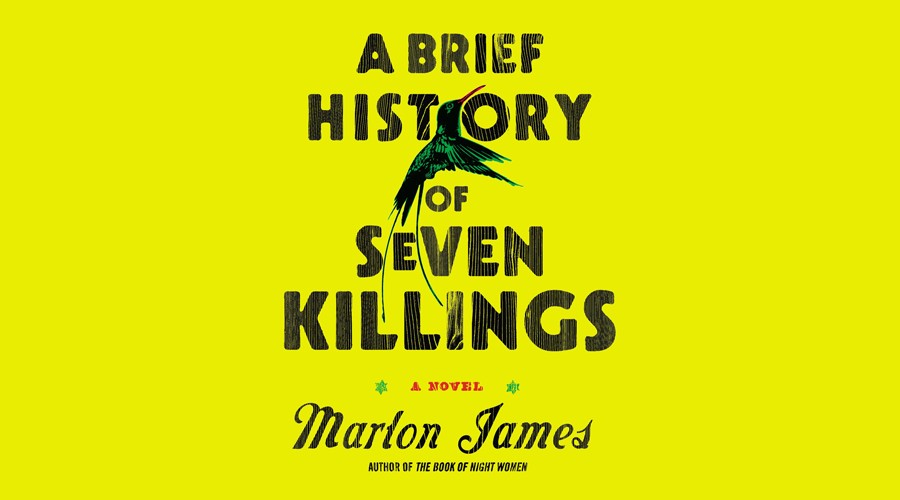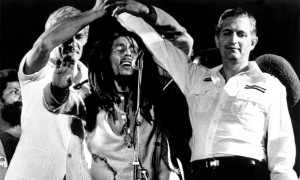 It took me a month to read all of A Brief History of Seven Killings. That’s not unprecedented, but it is a break from my regular reading habits. I tend to move from title to title with great frequency and if a book is taking me longer than two weeks the odds are good that it will get set aside. Sometimes a book is just too long to devour in that amount of time, but usually it indicates a waning interest on my part. So, it’s a strong compliment when I say that Marlon James’s epic new crime novel/mini-history/literary tour-de-force tested my reading resolve, but never broke it.
It took me a month to read all of A Brief History of Seven Killings. That’s not unprecedented, but it is a break from my regular reading habits. I tend to move from title to title with great frequency and if a book is taking me longer than two weeks the odds are good that it will get set aside. Sometimes a book is just too long to devour in that amount of time, but usually it indicates a waning interest on my part. So, it’s a strong compliment when I say that Marlon James’s epic new crime novel/mini-history/literary tour-de-force tested my reading resolve, but never broke it.
A Pulpy Crime Novel Based on Little-Known History
The quick summary is that Brief History revolves around the attempted assassination of Bob Marley in 1976. The would-be assassins broke into his home in Kingston two days before a peace concert that Marley was fronting. The concert was controversial, since it was nominally meant to unite the warring gangs of Kingston, but it was seen by many as an endorsement for the sitting leftist Prime Minister. While the assailants have never been identified, suspicion has long pointed towards the conservative Jamaica Labour Party, its CIA backers, and its gangland enforcers as the perpetrators.
James makes that attempted assassination, and Marley himself, as the invisible fulcrum around which decades of Jamaican history and culture have revolved. He depicts this by narrating events as far back as the dying days of the colonial era in Kingston all the way up to the drug warfare between rival Jamaican gangs in The Bronx in 1991. He opens the novel with the narration of a dead politician who wants to see commupeance for the rival that killed him and explodes from there to include slum dons, American music journalists, a woman desperately trying to escape the past that Jamaica represents, and a CIA station chief full of nothing but glib contempt. Notably, we never hear from Marley himself, here referred to as “The Singer.” He is the most famous Jamaican of all time, but never speaks here. He appears and disappears and eventually dies of cancer before the repercussions of the attempt on his life can play out. He is the absent center of a much larger story.
Literary Style and Ambitious Themes (Almost to a Fault)
There are two qualities to A Brief History of Seven Killings that make me recommend it after powering through its nearly 700 pages. First, and most immediately, it’s an incredible feat of writing. Marlon James is a native of Jamaica who now lives in the United States, making him deeply familiar with both the idiosyncratic Jamaican patois and the relatively flat speech of American English. The chapters each have a distinct narrator, which gives James the chance to display his command of their particular voice through long stream of consciousness discourses and descriptions. The absolute peak of this style comes during the assassination attempt on Marley, which James shows us through the internal monologue of several teenage gangsters who are so high on cocaine that they cannot form complete thoughts. It’s written like a long prose poem full of desire, anger, and violence with no coherent structure. By the time that segment ended, with the assassins coming down from their high and realizing they’re about to be killed themselves, it felt like I was suffering from withdrawals. Indeed, I’d say half the reason this took me so long was because the novel is too demanding to just pick up and read. It requires more of you than that.
The other great quality, one that only becomes apparent as pages fly by and the bodies start to pile up, is the scope of James’ ambition in this novel. The core idea, in my reading, is the way that violence provides the structure of society. He’s writing in the very specific context of Jamaican politics and popular culture here, but the theme is unavoidably universal. Every act of violence in A Brief History is retribution for some perceived wrong from the past and sets up another spasm of violence for the future. But even more than that, violence is inescapable. No matter how high or low on the social scale, Marlon’s characters find themselves enmeshed in a tidal wave of violence.
The specific causes and effects of these killings are not always apparent (hell, I’ll admit that I’m not even sure which seven the title refers to). But multiple characters repeat the maxim that “Good times was bad times for somebody” and James pursues that cynical truth with ferocity. A gang lieutenant arranges the assassination of his boss. A cartel plays two distributor gangs off each other. The police kill and abuse whatever poor people they can find. The CIA employs Bay of Pigs exiles to destabilize another Caribbean island and seem utterly unaware of the historical irony. The Don of Dons murders an entire crackhouse full of users because one addled soul shot urine in his face. A middle-class woman spends decades (and several identities) running from her Kingston past.
At the center of it all is “The Singer,” who is best remembered in popular culture singing “Don’t worry ’bout a thing.” But in Brief History he witnesses an extra-legal trial and execution and his Rastafarian followers lynch one of the would-be assassins. The karmic retribution that is his death from cancer just starts the cycle anew. In the end, James seems to be exploring how all that mayhem and amorality is not only the norm, but the very fabric of existence itself.







